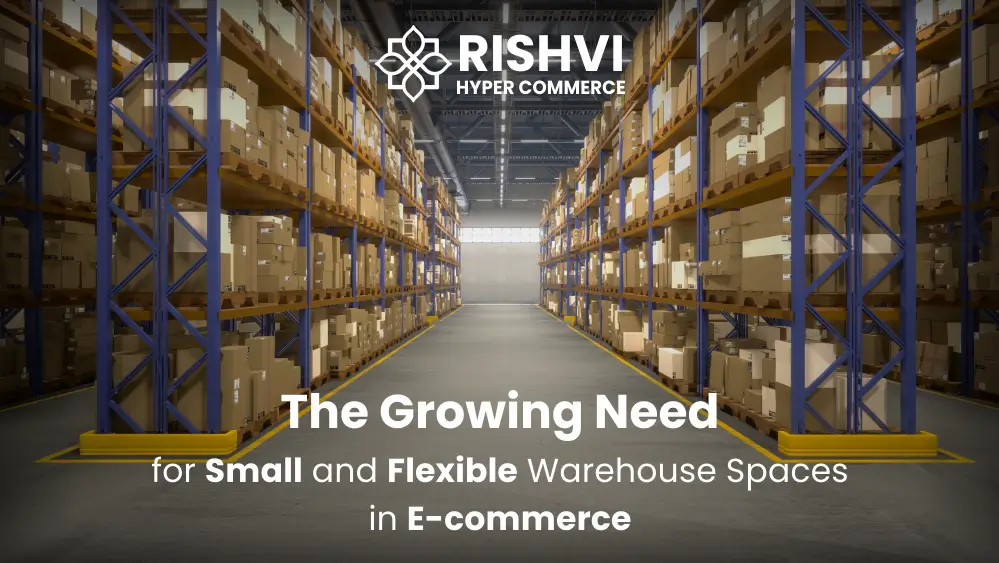
The e-commerce industry has been on an unstoppable growth curve. From small online boutiques to global retail giants, businesses are racing to deliver products faster, cheaper, and more efficiently. Behind the scenes, this race has put warehousing at the center of attention.
While massive fulfillment centers often grab the headlines, a new trend is reshaping the landscape: the demand for small and flexible warehouse spaces. For e-commerce businesses, particularly those catering to local and regional markets, these smaller warehouses are proving to be just as important—if not more—than mega distribution hubs.
Why Small Warehouses Are Becoming Essential
- Last-Mile Delivery Pressure
Customers expect same-day or next-day delivery as the new standard. To make that happen, e-commerce businesses need warehouse facilities closer to the customer. Small, strategically placed warehouses reduce shipping times and costs. - Cost Management
Renting or building a 500,000 sq. ft. warehouse isn’t always realistic for small or mid-sized businesses. Smaller warehouses offer a more cost-effective solution, especially for brands scaling up gradually. - E-commerce Flexibility
Product demand in online retail can fluctuate seasonally or even weekly. Flexible warehousing—spaces that can be leased on shorter terms—gives companies the agility to adapt without locking themselves into heavy long-term commitments. - Urban Demand
With cities being the largest consumption hubs, businesses need warehouses within or near urban centers. Since large tracts of land are scarce in cities, smaller warehouses fill this critical gap.
The Shift from “Bigger is Better” to “Smarter is Better”
Traditionally, logistics strategies focused on consolidating stock in massive warehouses located on the outskirts of cities or in central states. While this works for bulk storage, it creates bottlenecks for fast delivery.
Today, smart businesses are adopting a hub-and-spoke model:
- Big central hubs handle large-volume inventory.
- Small, flexible warehouses act as spokes, positioned closer to high-demand areas.
This hybrid model ensures products are always near the customer without sacrificing the benefits of large-scale distribution.
Who Benefits Most from Small Warehouses?
- Direct-to-Consumer (D2C) Brands – They thrive on customer satisfaction and quick delivery.
- Grocery & Perishable Goods Retailers – Proximity and freshness are non-negotiable.
- Seasonal Businesses – For example, holiday retailers can lease small warehouses temporarily to handle spikes.
- 3PL (Third-Party Logistics) Providers – They need a variety of warehouse sizes to serve diverse client needs.
The Role of Technology in Small Warehousing
Just because warehouses are smaller doesn’t mean they are low-tech. In fact, technology is what makes small warehouses highly efficient:
- Warehouse Management Systems (WMS) – Streamline order processing, stock tracking, and reporting.
- Automation Tools – Even smaller spaces now use smart picking systems, conveyors, and robotics.
- Data Analytics – Helps predict local demand, ensuring stock is in the right place at the right time.
Challenges of Small Warehouse Spaces
- Space Utilization – Every square foot counts, so design and layout optimization are critical.
- Scalability – Businesses must plan how to scale operations when demand grows beyond small spaces.
- Competition for Space – As demand rises, prime small warehouses in urban locations are becoming harder to find.
Future Outlook: Small, Smart, and Strategic
The warehousing industry is witnessing a fundamental shift. Instead of pouring resources into gigantic facilities, e-commerce businesses are investing in a network of smaller, flexible spaces. This trend is expected to accelerate as:
- Urban populations grow.
- Last-mile delivery becomes a competitive differentiator.
- Real estate costs keep climbing.
Forward-thinking businesses are already adopting this model to gain an edge in customer satisfaction and logistics efficiency.
In today’s competitive e-commerce market, speed and flexibility matter as much as price and product variety. Small and flexible warehouse spaces are no longer a secondary option—they’re becoming a core part of modern supply chains.
If your business is exploring smarter warehousing strategies, working with an experienced logistics partner can make all the difference. Solutions from Rishvi Ltd help businesses navigate this evolving landscape by offering insights, strategies, and tailored warehouse management services that align with growth goals.
FAQs
Q1. Why are small warehouses crucial in e-commerce?
Small warehouses enable companies to locate inventory in closer proximity to customers, minimizing shipping costs and delivery times. They’re particularly critical for addressing growing demand for same-day and next-day delivery.
Q2. How does a large distribution center differ from a small warehouse?
Big distribution centers keep bulk inventory and manage long-term stock, whereas small warehouses are agile, located in strategic locations, and engineered for rapid, last-mile deliveries.
Q3. In what ways do small warehouses save costs?
They minimize the requirement for costly, long-haul shipping and enable companies to rent only the area they require rather than investing in over-sized buildings.
Q4. Do small warehouses respond to seasonal peaks in demand?
Yes, small warehouses can manage seasonal demand peaks.
Yes. Most companies lease small warehouse facilities seasonally during high-demand periods (such as holidays) to cope with unexpected demand surges.
Q5. Are advanced technologies adopted by small warehouses?
Absolutely. Even smaller warehouses implement Warehouse Management Systems (WMS), automation software, and analytics to optimize space usage and efficiency.
Q6. Which sectors derive greatest benefit from small and agile warehouses?
E-commerce, grocery and perishable items, D2C brands, and 3PL providers are some of the leading industries utilizing smaller warehouses for efficiency and agility.
Q7. How do I start my business with flexible warehousing solutions?
The ideal way is by joining hands with logistics and warehouse management professionals such as Rishvi Ltd
who can help you with customized strategies for sourcing, scaling, and managing warehouse spaces efficiently.


